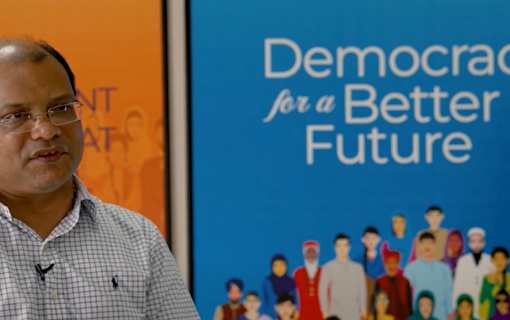IFES West Bank and Gaza Resource Centers Voter Education Project - In Advance of the January 20, 1996 Palestinian Legislative Council and Ra ees elections
EXECUTIVE SUMMARY
The International Foundation for Election Systems (IFES) is a nonprofit organization established in 1987 to support electoral processes and institutional development in emerging democracies. Nonpartisan in approach, IFES has carried out technical, advisory, conference and observation activities in more than 80 countries. Based in Washington, D.C., IFES has field offices in Africa, the Middle East, the former Soviet Union, Latin America and the Caribbean. The Foundation conducts pre-election assessments and provides on-site technical assistance, including legal analysis and legislative drafting, election commodities procurement, public opinion polling, nongovernmental organization institutional capacity building, voter and civic education activities, and election monitoring and observation projects. IFES also organizes symposia and regional conferences on electoral processes strengthening and democratization and publishes materials that promote the exchange of information within the international democratic development community.
The IFES West Bank and Gaza Resource Centers launched the Voter Education Project (VEP) in mid-December 1995, prior to the Palestinian Legislative Council and Ra'ees elections held on January 20, 1996. Through the VEP, IFES organized, in cooperation with the Palestinian Central Election Commission (CEC), nearly five hundred voting education workshops throughout the West Bank and Gaza to inform Palestinians about how, where and when to vote on election day. The project was conducted under the auspices of the IFES West Bank and Gaza Resource Centers' ongoing civic education and election assistance programs, and was financed by funds from the United States Agency for International Development (USAID)/West Bank and Gaza mission Grant # 294-0007-A-00-6519.
Because these elections were the first for Palestinians in the West Bank and Gaza, a wide-reaching, comprehensive voter education campaign was imperative. Most Palestinians knew little about the election process, the "right to vote," or the concept of voting by secret ballot. An IFES pilot program, for example, revealed that many Palestinians, including those with experience voting in university elections, planned to vote in the January election in a manner that would have spoiled thousands of ballots. The limited geographic reach of Palestinian television, however, precluded a conventional media-based voter information campaign.
In response to these circumstances, IFES helped the CEC to design a unique grass-roots voter education program including voting simulation sessions. During the month before election day, IFES organized and sponsored 498 voter education workshops in every village, town and city in the West Bank and Gaza, with multiple workshops in the larger communities. Election officials and student leaders from the Ministry of Youth and Sports (MYS) were selected as workshop leaders and trained by specialists from IFES and local non-governmental organizations. Special programmatic emphasis on women was reflected in the high number of female workshop trainers and leaders, and organization of women-only workshops in many regions. In designing the VEP, IFES drew upon the basic methodology of all its West Bank/Gaza civic education programs: emphasis on small, participatory groups rather than large lecture-style "classes"; geographic breadth; incorporation of local institutions in project design and implementation; use of Palestinians only as trainers and workshop leaders; outreach to all sectors of society; and targeting of women as both activity leaders and participants.
During the VEP workshops, leaders explained the Palestinian Electoral Law to participants, initiated discussions on issues relating to democracy and civic responsibility, and answered questions about the significance of the electoral process in the Palestinian transition to self-rule. Voter simulation activities also took place, in which participants practiced the actual steps of voting, from arrival at the polling place, to marking ballots, to placing ballots in ballot boxes. Workshops concluded with encouragements for participants to vote and to convey the information received to their families, friends and neighbors.
The VEP reached 67,000 voters directly, and many thousands of others indirectly through word of- mouth and informal knowledge-sharing. On the whole, the workshops received an overwhelmingly positive response from both participants and workshop leaders. The low incidence of spoiled ballots and the smoothly-conducted voting at the majority of polling places -during first-time elections-- are indications of the workshops' success. By encouraging grassroots discussion on the importance of political participation and free and fair elections, the YEP also contributed to the process of democratic institution-building during a historic period in Palestinian political life. As Jihad Abu Znaid, a workshop leader from Jerusalem, remarked, "the workshops became an important part of establishing our democracy."
Read the Full Report.









